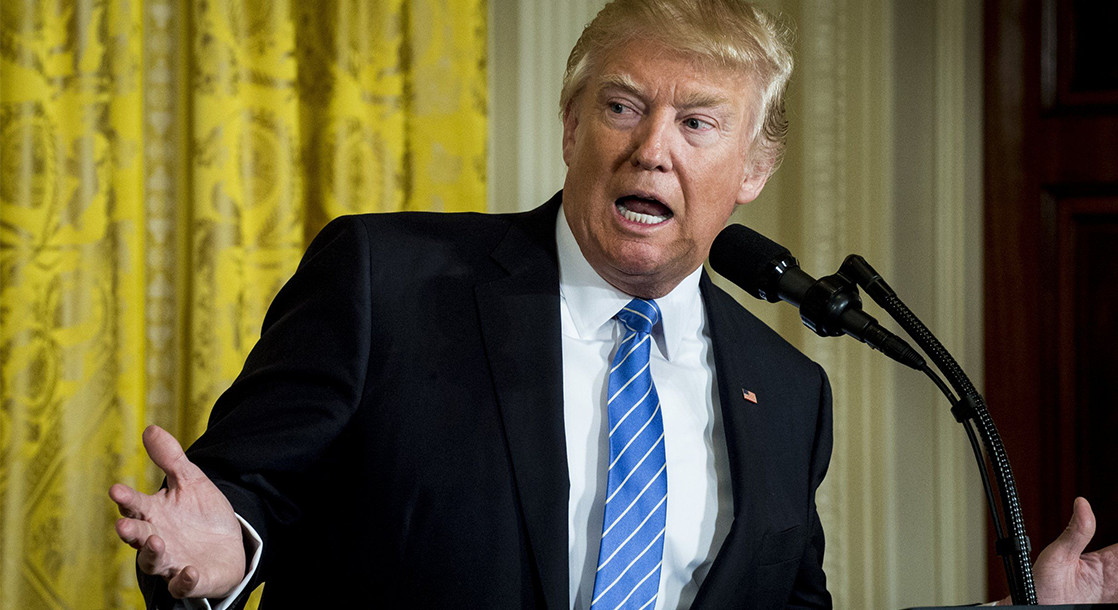Well folks, we’re just a few days away from the 100 day mark of Donald Trump’s presidency, and a lot has happened since the nationalistic demagogue has taken over the Oval Office. Whether it be his failed executive orders or the ensuing investigation on potentially illegal connections with Russia, controversy and political mayhem seems to follow the president at every waking moment. This week in the White House was no different, and the unpopularity of Trump seems to be trickling down onto his fellow Republicans in Congress. With the FBI’s investigation heating up, the GOP scrambling to save face, and the world anxiously awaiting his next move, the Commander-in-Chief continues down his increasingly divisive path. To keep you up-to-date with the latest happenings involving Trump and his cronies, here’s a detailed recap of “Everything the President Did This Week.”
This Week in Russia: Exxon Fails to Drill, Sally Yates to Testify, and More
-
Despite the ongoing U.S. sanctions placed on Russia, the oil giant Exxon Mobil has been pushing to gain permission to drill for oil and gas in the country. The push for the waiver came just one month after former Exxon CEO Rex Tillerson was confirmed as Secretary of State. But on Friday, the requested waiver was denied by the Department of Treasury, and follows suit with the Trump administration’s sudden change in tone towards Russian President Vladimir Putin.
-
Back in March, former acting Attorney General Sally Yates was prevented from testifying on the links between the Trump administration and Russia. The White House used its executive power to try and silence Yates, who was fired by Trump for instructing officials not to enact the President’s highly controversial Muslim Ban back in January. But now, in the first round of hearings since Devin Nunes recused himself, it looks like Yates is scheduled to testify behind closed doors on May 2.
-
As the FBI’s probe into the connection between the Trump administration and Russian officials continues, the highly controversial and unverified dossier that details the president’s alleged ties to Russia becomes more realistic by the day. It was recently revealed that the U.S. intelligence agency used the explosive dossier to request a surveillance warrant on Trump’s former campaign and foreign policy advisor Carter Page. The request signifies that the FBI had enough faith in the credibility of the document that they decided to present it in court, and ended up getting approval to spy on Page.
-
This past week, Richard Dearlove, the former head of the British intelligence agency MI6, claimed that Trump borrowed a hefty sum of money from Russia in 2008 to protect his real estate empire from being destroyed by the U.S. financial crisis. There’s no evidence to back up the claims of the now-retired Dearlove, but his accusation comes at a time where the aforementioned dossier, which was leaked by a British intelligence agent, continues to gain legitimacy.
-
A couple of weeks ago, it was revealed that Erik Prince, the founder of the paramilitary security force Blackwater, had privately formed a backchannel between the Trump’s inner circle and Russian officials. Since then, new information shows that Prince was advising the administration during the election from behind the shadows. He reportedly provided advice to a number of the president’s staff, including his former national security adviser Michael T. Flynn.
GOP Starts Taking the Brunt for Trump
-
The negativity and disdain surrounding Trump has started seeping into the GOP as well, as panic begins to mount about the upcoming midterm elections in 2018. The biggest warning signs for Republicans thus far is the immense success of Democratic candidate Jon Ossoff, who is running to represent the 6th district of Georgia in Congress. Although the region has always been considered a safe haven for the GOP, the charismatic newcomer crushed his Republican opponents in the recent special election. After garnering 48% of the votes from a pool of 17 candidates, Ossoff will face Karen Handel in a runoff election on June 20. Not only have local right-wing reps been accused of gerrymandering the 6th district, they’re also facing a lawsuit for allegedly disenfranchising voters. Georgia election officials have claimed that no new voters can register for the upcoming vote because it’s a continuation of the election that just transpired.
-
In a shocking and confusing turn of events, Utah Rep. Jason Chaffetz, who is also the Republican chairman of an investigative House committee, said on Thursday that he might resign from office before his term finishes next year. The reason for his possible leave is unclear, although there are rumors that he may run to become the Governor of Utah in 2020, but others are speculating more troublesome reasons involving his connections with Trump.
-
While the upcoming battle to control the House of Representatives heats up, the GOP may soon lose the most precious tool that helps them maintain power: gerrymandering. A case started in Wisconsin that claims Republicans used this tactic on the state back in 2012 is now headed to the Supreme Court. The SCOTUS has repeatedly said that extreme partisan gerrymanders are unconstitutional, but has never had a clear line to rule on. This could soon change with the upcoming case against gerrymandering, which would set a critical precedent and undoubtedly help Democrats in future elections.
A Day in the Mind of Donald Trump
-
For all of the criticisms leveled against the president, his ability to mentally defuse any rational argument has kept his diehard supporters at bay. A current lawsuit leveled against Trump claims that he urged his supporters to assault those who were protesting outside of his campaign rally. The White House moved to get the case thrown out last month, but a federal judge denied their request. Now, a new defense has recently surfaced straight from the president’s lawyers, who claim that Trump “is immune from suit because he is President of the United States.”
-
Another controversy that has surrounded Trump since before he was elected is his refusal to release his tax returns. Last Saturday, on the final day to file taxes in America, critics gathered to demand that the president release them. But White House Press Secretary Sean Spicer has continued to spout the same old argument that since Trump’s 2016 tax returns are under audit, they will not be released. Meanwhile, Trump has promised a "big announcement" this coming week about his plan to overhaul the U.S. tax code. An administration official has stated that the president's announcement will include "broad principles and priorities."
-
After Trump and the GOP-controlled Congress failed miserably to repeal the Affordable Care Act, the president has now resorted to demanding that Democrats work with him to change the healthcare system or else he’ll sabotage it. Trump has threatened to kill a critical part of the current healthcare system, which pays health insurers to offer lower deductibles and expenses to around seven million lower-income people. The president reportedly hopes that his intimidating tactic will get the left to negotiate changes to Obamacare.
-
During a conference at Yale University, a group of mental health experts publically announced that the president continuously exhibits signs that he is both “paranoid and delusional." The psychiatrists added that they believe it’s their “ethical responsibility” to warn the American public about the “dangers” that Trump’s psychological state poses to the country.
100 Days of Failed Promises
-
As we approach the 100th day under Trump’s reign, the laundry list of things he promised to accomplish in that span of time has largely remained unchecked. From his failed Muslim ban to his complete about-face on “draining the swamp,” the president is bracing himself for an onslaught of criticism from the media and his opposition in the coming days, and he has already started to preemptively defend himself on Twitter.
No matter how much I accomplish during the ridiculous standard of the first 100 days, & it has been a lot (including S.C.), media will kill!
— Donald J. Trump (@realDonaldTrump) April 21, 2017
-
While the president fails to deliver and continues to see his approval rating falter, the number of Americans who feel that Trump keeps his promises has also taken a nosedive. According to a recent poll conducted by Gallup, his trustworthiness in the eyes of the nation has decreased from 62 percent in February to just 45 percent this April.
-
If you’re wondering why the amount of trust and approval for Trump continues on a downward spiral, all you need to do is follow the money. While many dissenters are focused on Russia, American corporations are also using their stacked pockets to lure the president to do their bidding. This past week, it was revealed that Dow Chemical donated $1 million to Trump for him to ignore a study on the harmfulness of their pesticides. Regardless of the potential dangers that these hazardous chemicals — such as chlorpyrifos, diazinon, and malathion — present to the environment and the population, it’s clear that only money talks when it comes to getting into Trump’s ears.
Stirring Trouble Across the Globe
-
South Korea – Although South Korea is considered one of our closest allies in the increasingly tense standoff against North Korea, Trump displayed unprecedented ignorance this past week by claiming that “Korea actually used to be a part of China.” He claims that this information was passed onto him from Chinese President Xi Jinping during their recent meeting, and has agitated the South Korean government, which now wants a clear answer whether China’s leader really told him that or not. “It’s a clear fact acknowledged by the international community that, for thousands of years in history, Korea has never been part of China,” foreign ministry spokesman Cho June-hyuck said on Thursday.
-
North Korea – Meanwhile, North Korea and the United States have reached levels of tension that have not been seen in quite some time. As the dictatorship mulls over the possibility of another nuclear test and China searches for a diplomatic solution, Trump has been spreading his unique style of diplomacy through Twitter. This past week, North Korea accused the president of "making trouble" with his "aggressive tweets,” causing even more strain on top of the increasing military presence around the Korean Peninsula.
-
Middle East – While a handful of pundits have been praising the president for taking action against terrorists in the Middle East, there seems to be a lack of coverage regarding the havoc that he has been caused civilians and their towns. According to Airwars, a London-based independent monitoring group, the U.S. military dropped more bombs and killed more civilians in Iraq and Syria this past March than in any other month on record.
-
Venezuela – Over the past three weeks, millions have flooded the streets of Venezuela to protest the obscene condition of the country under President Nicolas Maduro. While the South American country faces grave economic problems and widespread food shortages, the ruthless leader has still managed to find a spare $500,000 to donate to Donald Trump's inauguration fund earlier this year. While the reason for this massive monetary gift is unknown, the White House has wisely started to criticize Maduro over his handling of the demonstrations, where dozens of Venezuelans have been killed and scores more injured.
-
Egypt – According to White House Press Secretary Sean Spicer, the president privately pushed for the release of Egyptian-American aid worker Aya Hijazi, who has been imprisoned in Egypt for three years over child abuse charges that were never proven. A number of human rights groups claimed the charges leveled against Hijazi and her Egyptian husband were unfounded, claiming that the arrests were part of a crackdown on nongovernmental organizations. This is the least reprehensible thing the President has done in a while, to say the least.
-
Elsewhere Around the Globe – On Saturday, both at the U.S. Capitol and across the world, protesters gathered for the “March for Science,” a global demonstration that opposes Trump's threatening budget cuts to agencies that promote and fund the work of scientists. The event took place in a wide range of cities across America, as well as in the U.K., Germany, Australia, and many other locations.











